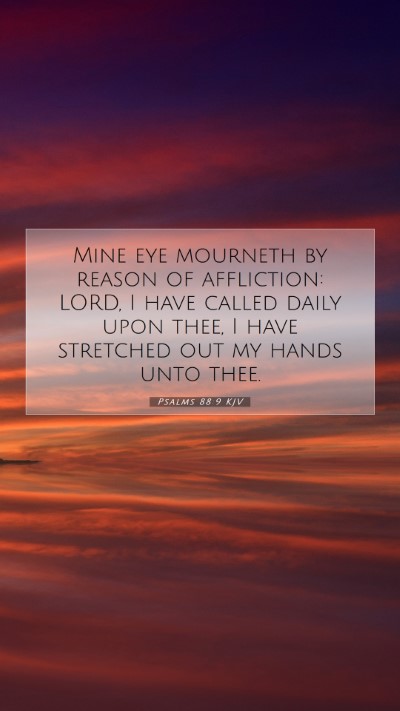Understanding Psalms 88:9 - A Comprehensive Bible Verse Commentary
Psalms 88:9 states: "Mine eye mourneth by reason of affliction: Lord, I have called daily upon thee; I have stretched out my hands unto thee." This verse is a poignant cry for help from a place of deep sorrow and despair. In this analysis, we will explore the meanings behind this verse, drawing insights from public domain commentaries by Matthew Henry, Albert Barnes, and Adam Clarke, to provide a thorough understanding and interpretation for those seeking Bible verse meanings and explanations.
Verse Breakdown and Context
The context of Psalms 88 is key to understanding its emotional weight. It is considered one of the most lamenting psalms, portraying the psalmist's feelings of isolation and abandonment in the face of suffering. This psalm is unique, as it does not conclude with a note of hope, unlike many other psalms of lament.
Matthew Henry's Commentary Insights
According to Matthew Henry, the phrase "Mine eye mourneth by reason of affliction" speaks to the overwhelming sorrow faced by the psalmist. Henry emphasizes the deep emotional pain that accompanies affliction and the psalmist's persistence in seeking God. The daily calling upon the Lord reflects a continuous yearning for Divine intervention and the stretching out of hands symbolizes a complete reliance on God.
Albert Barnes' Commentary Analysis
Albert Barnes notes that the expression "I have called daily upon thee" illustrates the fervency and desperation of the psalmist's prayers. Barnes underscores the importance of persistence in prayer, especially during times of suffering. The act of stretching out his hands is seen as a gesture of both supplication and appeal, emphasizing the psalmist's earnest desire for God's response.
Adam Clarke's Perspective
Adam Clarke provides an interpretation that aligns with the psychological elements of despair presented in the verse. He highlights that the phrase "Mine eye mourneth" suggests not only physical but also emotional lamentation. Clarke's view reinforces the idea that the psalmist is not merely asking for relief but is deeply aware of his condition, which affects his entire being, even his eyesight. He also comments on the importance of how this ache reflects a spiritual connection that remains open, despite the anguish.
Theological Implications
Psalms 88:9 resonates with anyone who has faced intense trials and tribulations in their lives. It serves as a reminder that the feelings of abandonment and sorrow are part of the human experience. Theologically, the verse holds significance in the understanding of lament as a legitimate form of communication with God.
Practical Applications
This verse can be applied in various ways for personal Bible study insights and group discussions:
- Understanding Human Emotions: Acknowledge that experiencing profound sadness is part of the spiritual journey.
- Importance of Prayer: Emphasize the need for consistent prayer in times of distress, as modeled by the psalmist.
- Community Support: Discuss ways in which community and church can provide support to those who feel alone in their afflictions.
- Encouragement to Others: Explore how this psalm can serve as a source of comfort for those who are grieving.
Related Scripture References
To deepen your understanding of Psalms 88:9, consider these related scriptures:
- Psalms 42:3: "My tears have been my meat day and night, while they continually say unto me, Where is thy God?"
- Psalms 143:7: "Hear me speedily, O Lord: my spirit faileth: hide not thy face from me, lest I be like unto them that go down into the pit."
- Job 30:20: "I cry unto thee, and thou dost not hear: I stand up, and thou regardest me not."
- Lamentations 3:49: "Mine eye trickleth down, and ceaseth not, without any intermission."
- Matthew 26:38: "Then saith he unto them, My soul is exceeding sorrowful, even unto death: tarry ye here, and watch with me."
Conclusion
In conclusion, Psalms 88:9 encapsulates the profound struggle between despair and hope in faith. It encourages an honest dialogue with God, reflecting on the nature of human suffering and the importance of steadfast prayer in the midst of trials. Through the insights provided by the commentators, we gain a deeper understanding of this scripture, which can greatly aid in personal reflection and group Bible study sessions.


